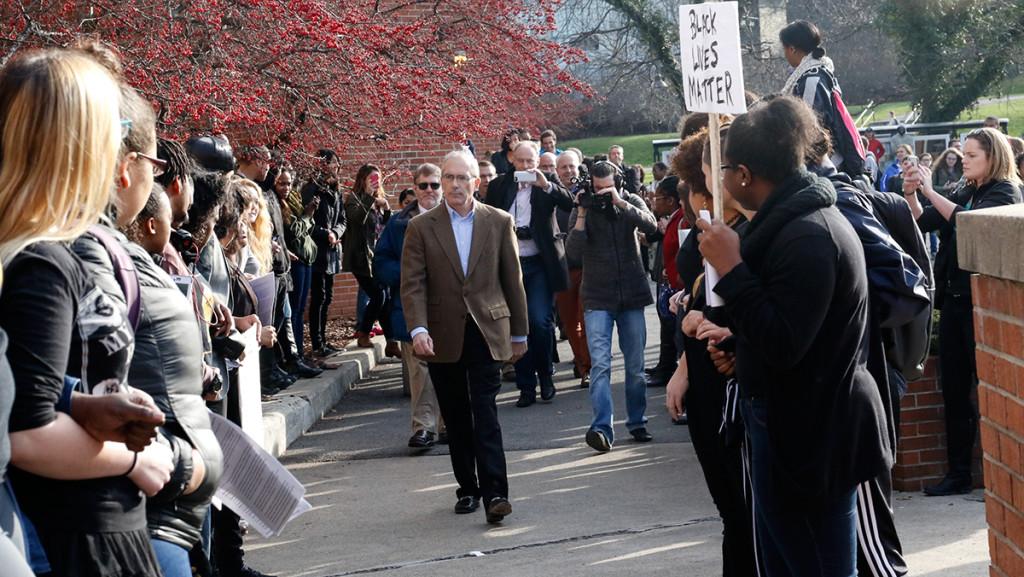As the presidential search committee begins its selection process during the summer of 2016, faculty and student leaders at Ithaca College, as well as experts in the field, say the protests leading to President Tom Rochon’s resignation last fall could affect the applicant pool for the college’s ninth president. Some believe it will bring in more candidates, while others disagree.
On April 4, a campuswide announcement stated the selected executive search firm, which will help recruit and vet candidates for the search committee to interview, will be Spencer Stuart.
Jim Nolan, chair and spokesperson of the presidential search committee, said Spencer Stuart has helped similar academic institutions like Colgate University and Middlebury College find presidents, making the firm stand out.
Spencer Stuart declined to comment on specific questions for this article, citing Nolan as the spokesperson.
Executive search firms can specialize in certain types of recruitment, like higher education leadership. This is the case for EFL Associates, an executive search firm with seven locations across the U.S. EFL was not considered to be the firm for the college.
However, Jan Asnicar, senior vice president of EFL, has extensive experience working to match institutions with candidates for leadership positions. Asnicar said the college’s national attention last fall regarding race on campus would not necessarily drive potential candidates away from the college, considering protests erupted at approximately 77 institutions nationwide.
“I don’t think it hurts any institution to have conflict out on the table,” Asnicar said. “I think what’s important to candidates is to learn how the institution is dealing with it.”
Similar to Asnicar, Peter Rothbart, chair of the Faculty Council, said the activism last semester at the college could make it an attractive landing spot for potential candidates.
“There are schools throughout the country that are going through similar sorts of situations,” Rothbart said. “I think the school needs to make constructive changes and then move forward. … If we do that sort of a thing, IC can be a very attractive place.”
On the other hand, Robert Kelchen, assistant professor of higher education in the Department of Education Leadership, Management and Policy at Seton Hall University in New Jersey, said he thinks the protests last semester could cause the potential candidate pool to narrow due to the nature of what the leader would have to bring to the table given the college’s circumstance.
Kelchen authors his own blog on higher education, which touched on the question of whether the campus protests last fall would affect higher education leadership. His blog has been cited by the Chronicle of Higher Education as a reliable source of insightful posts.
“It takes someone with the personal skills and with the ability to communicate and do damage control. That is something that not necessarily every college president needs to do,” Kelchen said.
Nolan said he thinks it is too soon to tell how the protests and their results will affect the applicant pool.
“I think it’s really way too early to know,” he said. “It is part of who we are as an institution. … It’s something we need to deal with and address, so it will certainly be part of what will help us define the profile of the next leader of Ithaca College.”
Senior Dominick Recckio, president of the Student Government Association, said he thinks it will be difficult to attract candidates to the college because the campus community will be hesitant to accept new leadership after last semester’s struggles.
“The position of the president has been sort of tainted in this year, and people are really starting to question systems of power and how … transparency works,” he said.
Recckio said that after talking with members of the Ithaca College Board of Trustees, he is concerned that some of the board members’ corporate backgrounds will lead to treating the institutional leadership selection as if it were “a CEO transition.”
Nolan, however, said he has confidence in the search process.
“I think the process is one of inclusiveness, it’s of multiple constituencies providing perspectives, and it’s one that is being done in consultation with a very respected outside interest,” Nolan said.
According to the college’s announcement, Spencer Stuart will be interacting with all constituencies at the college throughout April to include the campus community in this process. The firm had its first meeting with the search committee April 6.
“What’s really important for candidates is that they are getting the real story,” Asnicar said. “During this time, there probably has to be some healing, and the process of selection of another president can contribute to that.”








